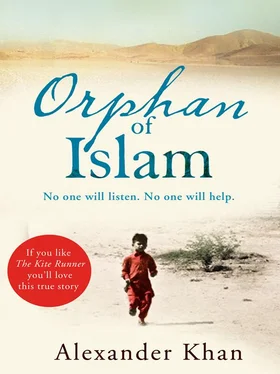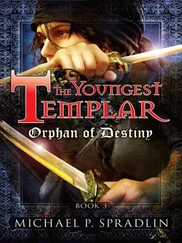‘Excellent!’ Rafiq leaned over and patted me on the back like an old friend. ‘I’m so pleased to hear you’re paying attention. But … were you at a different mosque tonight, Mohammed?’
‘No. Why?’ I could feel beads of sweat on my forehead, and the back of my neck was hot.
‘Only because Imam Farouk wasn’t very well tonight, as he said, and didn’t deliver the khutbah. So I’m not sure who you were listening to, Mohammed. Or if you were even there at all …?’
Rafiq moved from the doorway and sat uncomfortably close to me on the settee. He put his mouth right up to my ear.
‘Put down your food, go upstairs and wait for me,’ he hissed.
I dared not disobey him. I left the half-eaten bowl of curry on the arm of the settee and walked upstairs as calmly as I could, though I thought my legs would collapse on me at any moment.
The younger children were already asleep. I sat on the edge of my bed, my hands on my lap and my head bowed. Tomorrow was Dad’s funeral. None of this should be happening.
Rafiq let me sweat for 10 minutes before strolling up the stairs. He seemed to be in no rush.
Again he sat too close to me. ‘You didn’t go to mosque tonight, did you, Mohammed?’
I shook my head in response.
He tutted. ‘That was wrong, very wrong. You know what the Holy Prophet, peace be on him, says about going to mosque?’
‘As a Muslim I am obliged to go to mosque,’ I mumbled.
‘That’s right. So why didn’t you go?’
‘I did! I was … squashed in at the back. I left early because I couldn’t hear very well. I thought Imam Farouk was speaking, but maybe he wasn’t, I think it was someone else, I definitely heard those words, I …’
I was waffling, and he knew it. Suddenly he grabbed me by the neck and shoved me against the wall, just as he’d done the night before.
‘I warned you, you bastarrrrd!’ he said, raising his hand. I knew I was going to get it, but I wasn’t going down without a fight. I tried to wrestle out of his grip, kicking and twisting to get away.
‘Get off me!’ I screamed. ‘You’re not my dad!’
Immediately he relaxed his grip. I leaned against the wall, breathing heavily.
‘You’re right, Mohammed,’ he said, his face twisted into a mask of hate, ‘I’m not.’
And with that he raised his shut fist and punched me full in the nose. I heard a delicate bone crack on impact and I went straight down on the carpet. Blood was gushing over my mouth and onto my clean jumper. I tried wiping my nose, but it was too painful, and the sight of thick blood oozing across my palm made me feel sick.
Rafiq stood over me as I squirmed in agony. I looked up at him, my face a mixture of tears, blood and snot. He said nothing, just turned on his heel and left the room as calmly as he’d entered.
Surprisingly, none of the kids sharing the bedroom had been woken up by the violence – or if they had, they’d put their heads under the covers and kept very, very quiet. I don’t know how I got to sleep, with a face that felt as though it had been rammed against a brick wall, but somehow I did.
The pain was still there the following morning, and when Jasmine woke up and saw me, she screamed in horror. I shushed her up, explaining that I’d fallen off a wall while playing out and that I was OK. Today was Dad’s funeral. I didn’t want to give her any reason to be more upset than she already would be.
With hindsight, I should’ve gone straight down and told Abida what Rafiq had done. But I wasn’t sure that she’d believe me over her own brother. After all, I was the son of her rival for Dad’s affections, the spawn of the woman Dad had cheated on her with. She was as nice as she could be to me, but I didn’t know if I could trust her. And when Fatima had spoken about ‘you-know-who’ to her, I’d just known she was referring to me. Maybe Abida also believed I was bad. So I chose to say nothing, and when I came downstairs to breakfast with Abida, Rafiq and the children, nothing was said. It was as if I’d woken up with a slight sniffle.
Dad’s funeral was at the mosque, of course. According to custom, women stayed at home, so I accompanied Rafiq, Yasir and Dilawar to the service. The imam stood at the front and began to recite the funeral prayer, the ‘Salat al-Janazah’. This was accompanied by a lot of hand-raising and touching of the chest and various periods of kneeling and prostrating on the floor of the mosque. I’d never been to a funeral before and could barely understand what was going on, so I just attempted to copy everyone else.
Then the time came to ceremonially walk around the open coffin. I was nervous, as I had no wish to see my dad looking, well, dead, but Yasir steered me forward and I peeped over the top of the open box. Dad looked peaceful; tired, but peaceful. In a way, seeing him dead wasn’t such a bad thing, for now I knew that he had gone and wasn’t coming back.
Uncles and cousins patted me on the head and shook my hand after my walk around Dad’s body, telling me what a brave boy I was for not crying. The truth was somewhat different. I’d desperately wanted to cry, but as soon as I’d started to sniffle the pain in my nose had become unbearable and I’d had to stop. To make matters worse, Rafiq was playing the concerned relative, taking me to people who wanted to offer their condolences and agreeing that I was bearing up remarkably well. I could’ve punched him in the balls for what he’d done to me, but his powers of manipulation were too strong.
Finally, the imam said the words ‘Assalaamu ‘alaykum wa rahmatu-Allah wa barakatoh’ (‘Accept my thanks and gratitude, and may Allah bless you and direct your path’) and we left the mosque. Dad’s body would be taken by hearse to Heathrow airport then depart for Pakistan in a few hours. Two of his older relatives went with it.
I was escorted home and arrived to find, once again, a kitchen full of wailing women. It was all too much, so I sat in the backyard, scratching patterns on the moss-covered flag-stones with a broken piece of slate. In the living room Rafiq was making himself comfortable on Dad’s favourite side of the settee, settling down with a newspaper and looking extremely pleased with himself.
In Dad’s absence Rafiq appeared to make himself useful, at least in the first few months. He brought in some money – though never quite enough – as a taxi driver and would regularly do the shopping, arriving home with meat and vegetables for that evening’s tea. He even spent time talking to us children about our day and playing a little cricket or football with us in the backstreet. But his new-found parenting skills did not extend my way. He rarely spoke to me, and when he did, it was to interrogate me on what I was doing.
Abida seemed happy with her brother being around and chose to ignore his brutality on the night before Dad’s funeral. I think she was just pleased not to be alone; in her eyes Rafiq was providing for her and looking after the children. That was more than enough from a Pakistani man.
From an early age I’d worn mainly Western clothes, a mixture of hand-me-down or jumble-sale jeans, jumpers, shirts and cheap trainers thrown together with bits and pieces from traditional Muslim dress – salwar kameez tops and topi hats. Most kids my age were the same, and very few people thought it wrong or ‘un-Islamic’. We were all poor, and what we wore was a reflection of how much our parents had in their pockets. But Rafiq was different. Although he was personally happy to wear shirts, jeans and trainers while out working, he decided that I would be forbidden from wearing the gora, a term used to refer to white people. In this case he meant the English way of dressing. Even though I usually wore my jeans underneath my salwar kameez, they had to go, along with all my T-shirts. Rafiq gave no reason for this, except that he didn’t like seeing me in English clothes. I was allowed to keep my trainers only because they were black, and proper leather shoes were expensive.
Читать дальше












